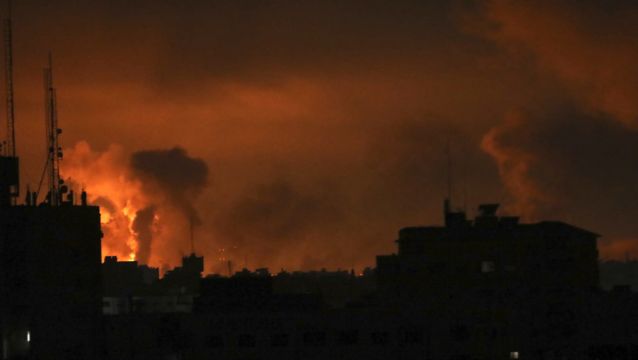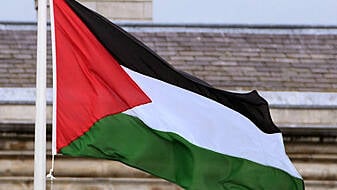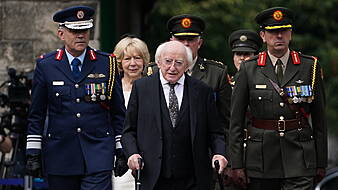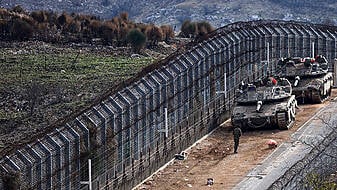Israel has knocked out communications in the Gaza Strip in intensified attacks, largely cutting off its 2.3 million people from contact with each other and the outside world, as the military said it was “expanding” ground operations in the territory.
The military’s announcement signalled it was moving closer to an all-out invasion of Gaza, where it has vowed to crush the ruling Hamas militant group after its incursion in southern Israel three weeks ago.
Explosions from continuous air strikes lit up the sky over Gaza City for hours after nightfall.
The Palestinian telecom provider, Paltel, said the bombardment caused “complete disruption” of internet, mobile phone and landline services.
Already plunged into darkness after most electricity was cut off weeks ago, Palestinians were thrown into isolation, huddling in homes and shelters with food and water supplies running out.
Relatives outside Gaza panicked after their messaging chats with families inside suddenly went dead and calls stopped going through.
“I was so scared this was going to happen,” said Wafaa Abdul Rahman, director of a feminist organisation based in the West Bank city of Ramallah. She said she had not heard for hours from family in central Gaza.
“We’ve been seeing these horrible things and massacres when it’s live on TV, so now what will happen when there’s a total blackout?” she said, referring to scenes of families that have been crushed in homes by air strikes over the past weeks.
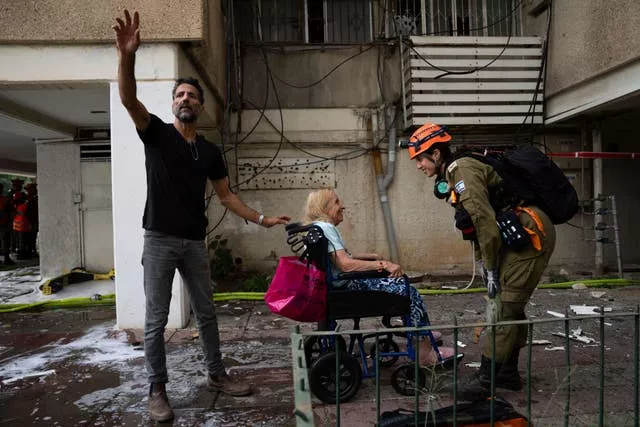
Lynn Hastings, UN humanitarian coordinator for the occupied territories, posted on X, formerly known as Twitter, that without phone lines and internet, hospitals and aid operations would be unable to operate.
The Red Crescent said it could not contact its medical teams and residents could no longer call ambulances, meaning rescuers would have to chase the sound of explosions to find the wounded.
International aid groups said they were only able to reach a few staff using satellite phones.
The Committee to Protect Journalists expressed alarm, saying the world “is losing a window into the reality” of the conflict. It warned that the information vacuum “can be filled with deadly propaganda, dis- and misinformation”.
Today I spoke with Israeli Minister of Defense Gallant. We discussed the need to facilitate humanitarian aid into Gaza and to ensure the protection of civilians. I expressed the U.S. commitment to deterring escalation, and our hope for the release of the remaining hostages.…
— Secretary of Defense Lloyd J. Austin III (@SecDef) October 25, 2023
Israeli military spokesman Daniel Hagari said ground forces were “expanding their activity” on Friday evening in Gaza and “acting with great force … to achieve the objectives of the war”.
Israel said its strikes target Hamas fighters and infrastructure and that the militants operate from among civilians, putting them in danger.
Israel has amassed hundreds of thousands of troops along the border with Gaza ahead of an expected ground offensive.
Earlier on Friday, the military said ground forces conducted their second hours-long incursion inside Gaza in as many days, striking dozens of militant targets over the past 24 hours.
The Palestinian death toll in Gaza has soared past 7,300, more than 60% of them children and women, according to the territory’s Health Ministry. A blockade on Gaza has meant dwindling supplies, and the UN warned that its aid operation helping hundreds of thousands of people was “crumbling” amid near-depleted fuel.

More than 1,400 people were killed in Israel during Hamas’ October 7 attack, according to the Israeli government, and at least 229 hostages were taken into Gaza.
Palestinian militants have fired thousands of rockets into Israel, including one that hit a residential building in Tel Aviv on Friday, wounding four people.
The overall number of deaths far exceeds the combined toll of all four previous Israel-Hamas wars, estimated at around 4,000.
Defence Minister Yoav Gallant told foreign reporters that Israel expects a long and difficult ground offensive into Gaza soon.
It “will take a long time” to dismantle Hamas’s vast network of tunnels, he said, adding that he expected a lengthy phase of lower-intensity fighting as Israel destroys “pockets of resistance”.

His comments pointed to a potentially gruelling and open-ended new phase of the war after three weeks of relentless bombardment.
Israel has said it aims to crush Hamas’s rule in Gaza and its ability to threaten Israel.
But how Hamas’s defeat will be measured and an invasion’s end game remain unclear. Israel says it does not intend to rule the tiny territory of 2.3 million Palestinians but not who it expects to govern — even as Mr Gallant suggested a long-term insurgency could ensue.
The conflict has threatened to ignite a wider war across the region.
Arab nations — including US allies and ones that have reached peace deals or normalised ties with Israel — have raised increasing alarm over a potential ground invasion, likely to bring even higher casualties amid urban fighting.
Jordanian foreign minister, Ayman Safadi warned on X that the “outcome will be a humanitarian catastrophe of epic proportions for years to come”.
